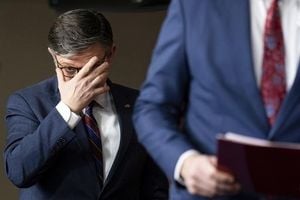KYIV, Ukraine — A significant escalation occurred on Tuesday as Ukraine fired several U.S.-supplied longer-range missiles, known as the Army Tactical Missile System (ATACMS), inside Russia, marking the first time Kyiv has used these weapons to strike Russian territory during the nearly three-year conflict. This action coincided with Russian President Vladimir Putin’s formal announcement of a lowered threshold for the use of nuclear weapons, indicating potential retaliation against conventional attacks supported by nuclear powers like the U.S.
The Ukrainian military claimed to have targeted and successfully struck an armaments depot located approximately 110 kilometers (about 70 miles) within the Russian border, igniting secondary explosions. Although Russia’s defense forces claimed to have intercepted five of the six missiles, they reported damage from the debris of one missile hitting the facility without causing casualties.
According to U.S. intelligence, Ukraine launched about eight ATACMS missiles, with two reportedly being shot down by Russian defenses. This heightened military engagement was emphasized as both nations maneuver through increasingly complex geopolitical terrain, not least because of the U.S. support pledges, which have raised tensions about how far the West will go to substantiate its backing for Ukraine.
Experts suggest the firing of ATACMS signifies not only Ukraine's enhanced military capabilities, owing to U.S. support, but also reflects broader strategic shifts. President Joe Biden’s administration had authorized this usage of the missiles earlier this week, marking it as the latest step across the lines Putin had drawn, including earlier military aid provisions. Biden's cautious but progressive approach has been viewed within U.S. circles as necessary to aid Ukraine without igniting direct conflict.
Putin’s response has been one of alarm, as he reiterated his belief during past months—through creeping escalations and nuclear rhetoric—that Western involvement amounts to direct participation in the conflict, with potential repercussions should Ukraine utilize Western-supplied weaponry against Russian assets. Following the missile strike, Putin's administration labeled the U.S. as complicit, implying they now bear responsibility for Ukraine's offensive actions.
This incident falls on the 1,000th day of the war, underlining the protracted nature of the conflict and the persistent stalemate both sides have encountered on the battlefield. Analysts highlight the importance of this timing—both for Ukrainian morale and geopolitical leverage—with President-elect Trump reportedly planning to significantly adjust U.S. aid directed toward Ukraine upon his assumption of office.
Professor Steve Fetter of the University of Maryland noted, "The revision of Russia’s nuclear strategy and their statements related to ATACMS strikes appear to be strategic posturing. The depth of Russia's threats must be contextualized against their own military challenges and the feasibility of such escalatory actions." This indicates international dynamics increasingly reflect perceptions of threat rather than grounded military strategies.
The use of long-range weapons signifies Ukraine's operational aspirations to disrupt Russian command and control, allowing targets beyond the immediate conflict. This tactical dimension is paralleled by Ukraine's consistent claims of devastating attacks against Russian operational positions.
Compounding the situation are recent reports of North Korean troops aiding Russian forces, which elicited strong reactions from U.S. military and intelligence circles, emphasizing the complex interplay of powers affecting the war. Government officials have expressed urgent concerns over the burgeoning alliances and enhanced military capabilities being shared among these nations, particularly as the confrontation escalates.
Despite this heightened level of conflict, Fetter expressed skepticism over the likelihood of immediate nuclear escalation from Russia due to Ukraine's actions. "The rhetoric around nuclear use has often been interpreted as bluffing to intimidate Western involvement and deter military support for Ukraine," he said. This sentiment resonates amid speculation about Putin’s actual red lines, with analysts urging caution over how the missile strikes may lead to miscalculations or unintended escalations.
Ukrainian President Volodymyr Zelenskyy commented on the missile strikes, stating, "Ukraine has long-range capabilities, including domestically produced long-range drones ... and now we have ATACMS as well," asserting Ukraine's readiness and resolute commitment to challenge Russian initiatives on their territory. He hinted at the utility of these capabilities as strategic assets against Russian aggression.
The continuing violence—from Russian drone attacks resulting in civilian casualties to Ukrainian missile strikes—points to the war’s enduring tragedy. The relentless nature of this conflict raises questions about the long-term sustainment capabilities of both nations and the ultimate goal of U.S. military support.
Significantly, discussions about ending the war are heating up as the Biden administration has walked toward endorsing direct military support to bolster Ukraine's defensive operations. The shifts brought forth could define U.S. foreign policy and international relations with fellow NATO allies over the next several years.
Moving forward, the battle lines may not only signify territorial stakes but symbolize the greater ideological and geopolitical struggles playing out on the global stage. Both sides are viewed to be holding positions, yet neither can sustain prolonged conflict indefinitely. Analysts contend this dilemma faces not only Russia and Ukraine but also involves their allies, who now must navigate the thin lines of military and diplomatic orchestration against the backdrop of nuclear uncertainty.



